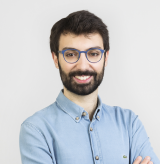A mathematician trained at l’X in the 2021 list of Forbes 30 Under 30


Congratulations on your inclusion in the 2021 Forbes 30 Under 30 - Europe list. According to you, what are the key factors of this nomination?
Thank you! It is indeed a great honor when we see the number of nominations received by Forbes each year. I think two main factors played a role: I was fortunate enough to work on problems that interest a lot of people, and to work in several very stimulating teams, with which we have made good progress in mathematics recently.
I owe this distinction to all those around me who have encouraged and supported me for many years, but also to about 30 exceptional co-authors whose work this is, as much as it is my own. I am also very happy that mathematics has again been honored in the Forbes 30 under 30 list: there had been no mathematicians in the European list since 2016. Yet mathematics is at the heart of the society in which we live. The majority of people use mathematics every day, whether consciously or not. For example, the simple act of using your cell phone calls for tools that were originally very abstract, such as the Fourier Transform.
Can you throw some light on your research topics?
I'm currently a permanent researcher at the CERMICS laboratory at Ecole des Ponts Paristech. I study the stabilization of systems of nonlinear hyperbolic partial differential equations. The name can be a bit scary at first. Basically, we work on very abstract objects such as discontinuous solutions or entropy conditions and which paradoxically can be used for very concrete applications such as the regulation of rivers, or the reduction of traffic jams on highways, and therefore CO2 emissions. This last example is also the subject of the CIRCLES project in the United States, of which I am a part.
At the same time, I am working with researchers at Facebook to teach mathematical problems to an artificial intelligence. It is an idea that may seem a little crazy. The craziest thing is that it works. What is innovative and which may be surprising from the outside is that we use models that were not originally made for mathematics but for translation. And we manage to translate problems into solutions.
What did your education at l’X bring you?
I'm a researcher, so it's no surprise that I use what I learned very often in science classes at l'X. But the École Polytechnique gave me more than that. L'X is a place where you learn both scientific concepts through lessons and take responsibility through involvement in associations and of course the Human and Military Training, especially during the internship you have to do. The meetings I made there also marked me a lot: I met great people with whom I am fortunate to always be in contact and sometimes to work with. I also had the opportunity to spend time at other great universities like Harvard or Cambridge. L'X remains the school that structured me, it is really unique to me.
What are your short, medium and long-term goals?
I have plenty of them! I would like to make the link between the stability of nonlinear hyperbolic systems and their linear approximations. This would make it possible to have a generic method which is currently lacking.
The project to reduce CO2 emissions from road traffic using mathematical algorithms is also close to my heart because it illustrates how abstract mathematics can have very quickly positive consequences on the everyday life. It is also a stimulating and unusual teamwork experience: working with 50 researchers in five partner universities with research groups whose specialties range from abstract mathematics to electrical engineering, including mechanics and computer science.
Finally, I would like to see how artificial intelligence can help mathematicians and contribute to future great mathematical discoveries. Solving a math problem sometimes involves seeing something that is hidden or recognizing a hard-to-see link, and neural networks have shown a great ability to see links and similarities that we humans don't see. I am one of those who thinks that neural networks can help mathematicians solve unresolved problems, or even be trained to prove results on their own. On this subject too, I have the good fortune to work as a team with very talented people.
 Support l'X
Support l'X